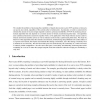Free Online Productivity Tools
i2Speak
i2Symbol
i2OCR
iTex2Img
iWeb2Print
iWeb2Shot
i2Type
iPdf2Split
iPdf2Merge
i2Bopomofo
i2Arabic
i2Style
i2Image
i2PDF
iLatex2Rtf
Sci2ools
135
click to vote
SRDS
2003
IEEE
2003
IEEE
Autonomous Replication for High Availability in Unstructured P2P Systems
We consider the problem of increasing the availability of shared data in peer-to-peer (P2P) systems so that users can access any content, regardless of the current subset of online peers. In particular, we seek to conservatively estimate the amount of excess storage required to achieve a practical availability of 99.9% by studying a decentralized algorithm that only depends on a modest amount of loosely synchronized global state. Our algorithm uses randomized decisions extensively together with a novel application of the Reed Solomon erasure codes to tolerate autonomous member actions as well as staleness in the loosely synchronized global state. We study the behavior of this algorithm under three distinct environments, modeled using data published from earlier studies of a corporate environment, the Napster and Gnutella file sharing communities, and a file sharing community local to students of our University. We show that while peers act autonomously, the community as a whole will...
Algorithm | Availability | Global State | SRDS 2003 |
Related Content
| Added | 05 Jul 2010 |
| Updated | 05 Jul 2010 |
| Type | Conference |
| Year | 2003 |
| Where | SRDS |
| Authors | Francisco Matias Cuenca-Acuna, Richard P. Martin, Thu D. Nguyen |
Comments (0)

